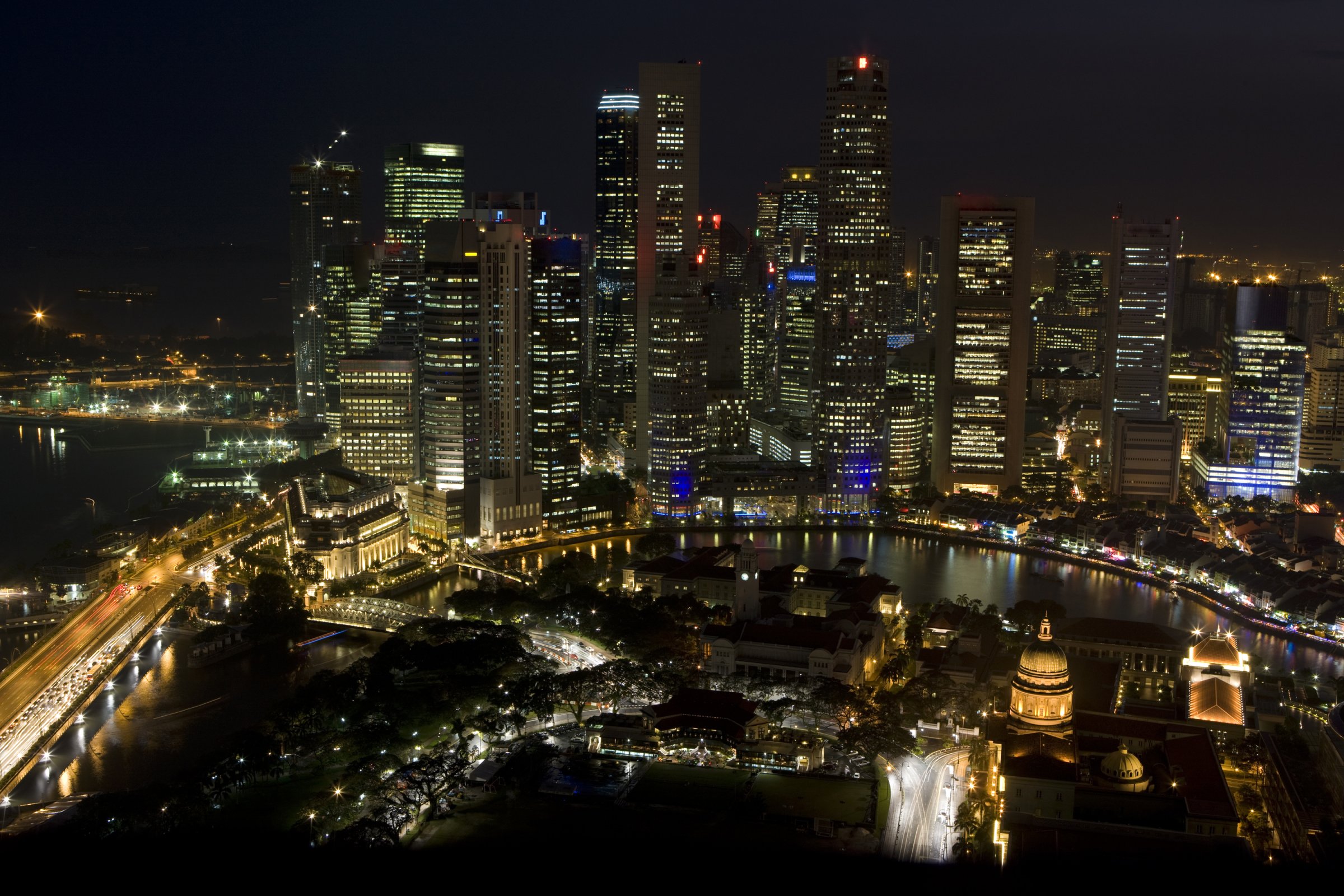
You land at Changi Airport after flying for what seems a lifetime, and you’re disoriented even before you hit the customs booths with bowls of mints, dire warnings about the death penalty for those bringing in drugs, and digital comment cards asking if the service was to your liking.
Duck into a public restroom and you’ll be exhorted to aim carefully and to “flush with oomph” for the sake of cleanliness. Outside, it’s tropical sticky but impeccably clean, in a city is inhabited by Chinese, Malays, Indians, and guest workers from around the world—all speaking English.
Singapore is an assault on one’s preconceptions.
Singapore calls itself the Lion City, but it would be more accurate to call it the Canary City—the canary in globalization’s gold mine. Arguably no other place on earth has so engineered itself to prosper from globalization—and succeeded at it. The small island nation of 5 million people (it’s really just a city, but that’s part of what’s disorienting) boasts the world’s second-busiest seaport, a far higher per-capita income than its former British overlord, and a raft of number-one rankings on lists ranging from least-corrupt to most-business-friendly countries. So long as globalization continues apace, the place thrives.
On the event of its 50th anniversary as an independent nation, Singapore’s defining achievement is summed up in the title of its longtime leader Lee Kwan Yew’s memoir, From Third World to First. When it split off from Malaysia a half-century ago, Singapore had little going for it, other than a determination to become whatever it needed to be—assembly plant, container port, trustworthy banking and logistics center, semiconductor hub, oil refinery, mall developer, you name it. But the brilliance of its founding fathers—OK, it was mostly one father, Mr. Lee—was in realizing that the precondition for all of this was good governance.
Over a recent week of briefings with Singaporean business and government leaders sponsored by the nonprofit Singapore International Foundation, I heard one business leader say that he has never had to pay a bribe in his lifetime. To an American audience, that may seem like a fairly modest boast, but as this speaker noted, it’d be a difficult claim to make in neighboring Southeast Asian countries (or developing nations anywhere). Like Americans, Singaporeans worship the concept of meritocracy. Unlike Americans, Singaporeans entrusted their society to an all-knowing one-party technocracy that has delivered the goods across two generations—including affordable, publicly built housing for a majority of the population and a system of private lifetime savings vehicles that are the envy of policy wonks the world over.
Still, even at the height of its success, Singapore doesn’t get much love from the legions of foreigners who avail themselves of its First World amenities. It’s almost obligatory for Westerners visiting or residing in Singapore to complain about the “sterility” of the place, and joke about the pristine shopping malls, contrasting Singapore unflatteringly to the grittier authenticity of nearby Cambodia and Vietnam.
It’s a form of colonial prejudice to begrudge Singaporeans their lack of Third World “charm.” But the interesting new wrinkle is that Singaporeans themselves are joining in the second-guessing about the price of development.
Opposition parties are gaining some ground, capitalizing on unhappiness with strained public services, soaring prices, and an influx of super-wealthy foreign investors. Having taken care of its population’s basic needs and then some, it must be galling for Singapore’s relentlessly pragmatic leadership to see a surge of yearning for rooted authenticity. The few older neighborhoods that haven’t been demolished—including the first generation of public housing complexes—are now heralded as historic landmarks.
This ill-defined sense of nostalgia reflects the tensions inherent in globalization. You can leverage all of your comparative advantages to succeed in the global marketplace, only to end up feeling some unease at having your distinctive sense of place eroded.
Until recently, Singapore was among the most welcoming places to outsiders, with one out of every three residents born elsewhere. But with fertility rates dropping, the country opened the floodgates to immigrants to ensure continued growth—turning immigration into a lightning rod. One triggering event for a national debate on the subject was a modest riot late last year in the city’s Little India Quarter. A government official, off-script, said with some relish: “Imagine that, we had a riot: we must be a real place.”
In the aftermath, the government slowed down its intake of immigrants and tapered its growth projections. The move was a testament to how responsive Singapore’s system can be to its citizenry’s needs and desires, without being terribly democratic.
It was a testament, too, to how perfect Singapore—and its paternalistic, technocratic cosmopolitanism—is for this age of interdependence.
Andrés Martinez is the Washington editor of Zocalo Public Square, for which he writes the Trade Winds column, and Vice President of the New America Foundation.
More Must-Reads From TIME
- The 100 Most Influential People of 2024
- The Revolution of Yulia Navalnaya
- 6 Compliments That Land Every Time
- What's the Deal With the Bitcoin Halving?
- If You're Dating Right Now , You're Brave: Column
- The AI That Could Heal a Divided Internet
- Fallout Is a Brilliant Model for the Future of Video Game Adaptations
- Want Weekly Recs on What to Watch, Read, and More? Sign Up for Worth Your Time
Contact us at letters@time.com